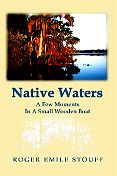|
I awoke this morning to the sound of rain.
Half-expecting it from the forecast, the
disappointment set in anyway. So many things
I wanted to get done today, fishing not the
least of them.
Rolling over, I glanced out the window. Gray
skies dropped rain, the roofline streamed it
before the window. Groaning, I collapsed back
to the pillow. Temperatures have been mild,
reaching the high seventies yesterday with a
banshee wind. With no reason to get up, I just
lay there and listened to the rain, and the
house responding to the changes in temperature
and humidity. It moves, this old house, creaking
and groaning, and sometimes when pressures build
up over time between frames, joists or crown
molding, it will snap loudly, startling me. It
is awakening to spring, this old house, flexing
and stretching its muscles and bones.
But the rain didn't let up. I got up and made
strong coffee, taking a cup to the piddling room
and opening all the blinds. I sat there at my
piddling desk, noticing a half-finished Jitterbee
in the vise, but ignored it. Sipping coffee,
watching the rain outside, I was still comforted.
Surrounded by things cherished and familiar to
me in that room. Staring out the window at the
front yard, the rain seemed to distort the present,
open glimpses to other times between the falling
curtain of drops.
The coffee was black and unsweetened, the way
I like it, thick and strong Cajun brew. The
smell of freshly ground coffee beans used to
permeate this old house when my grandmother
set up the antique grinder. She always added
eggshells to her coffee when she brewed it,
said it calmed the bitterness. I was but a
child when we ground coffee together in this
house and sometimes the smell of it brewing
reminds me of her.
Out there in the front yard, dimmed by the
rain, shadows moved between the two sago
palms planted by my great-grandmother to
memorialize the death of Constance Stouff,
her daughter, who died of a fever before
she was a teen. Those palms are nearly a
hundred years old now. Off past the palms,
nearer the road, the rain drops thin veils
through which I can almost see a horse-drawn
wagon approaching the house. It carried the
bruised, cut and bleeding body of a young
Indian man who needed my great-grandmother's
care as medicine woman. There had been a dispute
off the reservation over a white man's wife, I
was told, and as I watched in my mind's eye the
wagon bringing the boy up to the door, I recalled
how it wouldn't be long before the sheriff and
a deputy would arrive, demanding the surrender
of the boy.
The truth remains indistinct, like the veils
of rain falling outside, like the scent of my
coffee conjuring grinders from the past. What
caused the mob to fall on him remains unclear.
But the sheriff arrived, demanding the boy
turn himself in. My great-grandmother, Delphine,
went out to meet them. She refused them steadfastly.
But terrified, the boy found the strength to
flee out the back door. The sheriff drew his
pistol, took aim and shot the boy in the back
of the head, dropping him dead there on the
spot, on the same ground I sat and looked out
at this morning, drinking coffee and watching
rain.
Delphine shrieked and threw herself at the
sheriff's throat, but he beat her down with
the pistol. As she lay there at his feet,
stunned by the blows, he pointed the gun
at her head and cocked the hammer. Yet the
deputy dissuaded him. "There's been enough
bloodshed," he told the rage-maddened sheriff.
"You can explain the boy, how are you going
to explain this?"
I get more coffee, go and open the door to
let fresh air into the house. The yard is
almost a shadow under the rain. The next
day, the rain reminds me, a mob from the
local community drove through the reservation,
a gang of thugs, shooting at anything that
moved. No injuries were reported, but an
entire day of terror dragged on into eternity,
gunfire snapping, women and children huddling
in their homes, crying out at the sound of
blasts and breaking window glass, at bullets
hitting cypress planks and doors. Eventually
the mob dispersed, and an uneasy truce again
persisted between the Indians and those nearby.
They took a door down from inside the house
and placed it on sawhorses. The boy's body
lay here, as the women cried and the children
wailed, and the men sang songs eight thousand
years old. This old house soaked their tears
into its floors, saturated its ceilings with
their sobs. It holds all of these still. Later,
the boy was buried in a Christian cemetery just
across the street from where he was cut and
beaten.
The Indians filed charges, and a grand jury
returned no true bill. The incident was quickly
brushed aside. Justice remains unserved to this
day, but both the perpetrator and the victim lie
in the same ground, and face the same Creator
to answer for their lives.
The rain continues to fall. The coffee is
steaming in my hand. I feel selfish for
bemoaning the rain, because I can't go
fishing, or cut my mom's grass like I
promised, or piddle with building the
boat. When ninety years ago a murder
played out right here at my doorstep,
I stand here safely, unafraid. I am
well-known and well-respected in my
community, a journalist who may not
always be liked, but always above reproach.
Some weeknights I go to wine tastings at
a friend's restaurant, though I am not
much of a wine drinker. I trade jokes
with doctors, lawyers, businessmen and
city council members. I fish with good,
upstanding people who take me for what
I am, no more, no less.
But sometimes I forget that I come from
murder. Murder and oppression. When I
begin to lose sight of who I am and where
I have come from, the rain reminds me, the
house jogs my memory, and both humble me.
I am not bitter. I am not one of those
indigenous persons who believe we are
owed anything except this: Never forget.
That's all. Don't brush it aside, don't
alter the history books, don't mince the
words. Just never forget.
There'll be no fishing today, yet again.
But I let the irritation fade, and count
myself among those descended of incredible
bravery, monumental resolve. Perhaps I
won't be able to take a fine bamboo fly
rod in a nice boat out to the lake today,
but I can rest easy here knowing that my
freedom and my place in the community was
earned in part by my own accomplishments,
and also by the sacrifices of those who
came before me. Their blood still rests
in the soil outside where rain is tempering
the past with soothing grace. Their voices
still rest in the ceiling joists here, the
floors and the doorframes. I finish tying
the Jitterbee and put it in my fly box. I
clean house a little. I sit down under a
warm lamp and read for a couple hours.
Just after noon, I surprise myself with a
yawn. I lay on the sofa and let the sound
of the rain on the metal roof sing lullabies.
The cat comes, nuzzles her head against my
cheek for a moment, then settles in beside
me and closes her eyes, a calico ball of
contentment. I drift off to sleep, and
think of legacy. Perhaps it was better to
not go fishing today after all. There'll
be other days. Perhaps today was a good
day to remember things I never lived. A
good day to open my ears and heart to hear.
Rain fell all day. ~ Roger
 It's out! And available now! You can be one of the
first to own a copy of Roger's book. Native Waters: A
Few Moments in a Small Wooden Boat
It's out! And available now! You can be one of the
first to own a copy of Roger's book. Native Waters: A
Few Moments in a Small Wooden Boat
Order it now from
www.iuniverse.com, Amazon.com,
or Barnes & Noble.com.
Roger will also be giving away three autographed copies to
readers. Stay tuned, for an announcement on the Bulletin
Board on that soon.
|


 It's out! And available now! You can be one of the
first to own a copy of Roger's book. Native Waters: A
Few Moments in a Small Wooden Boat
It's out! And available now! You can be one of the
first to own a copy of Roger's book. Native Waters: A
Few Moments in a Small Wooden Boat